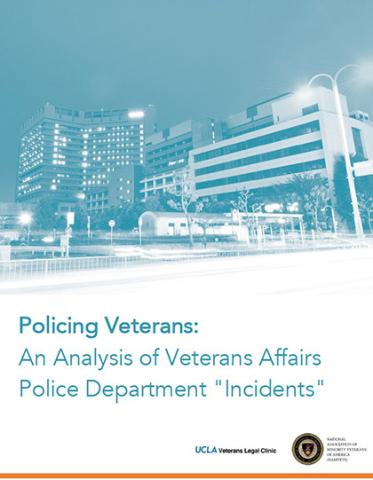Veterans Legal Clinic Issues Report on VAPD Incidents

UCLA School of Law’s Veterans Legal Clinic, in partnership with the National Association of Minority Veterans of America (NAMVETS), has issued a new report, “Policing Veterans: An Analysis of Veterans Affairs Police Department Incidents.” The report analyzes interactions between veterans seeking health care treatment at Veterans Affairs (VA) facilities and the VA Police Department (VAPD) and concludes that VAPD actions impede the VA mission of delivering veteran-centered care. Associate Professor of Law Sunita Patel and UCLA Law students Jess Johnson ‘23 and Charlie Pollard-Durodola ‘22 worked with NAMVETS of America to draft the report.
Based on data obtained through to a Freedom of Information Act (FOIA) request, the report is the first in a series expected to document VAPD practices at four VA health care facilities: Columbus, Ohio; Tampa, Florida; Queens, New York; and Los Angeles. This is the first time that VAPD “incident” data has been made publicly available and been analyzed by advocates.
“The VAPD are involved in patient’s experiences at these facilities to a degree that is concerning to both NAMVETS and the authors,” says Patel.
Key findings and recommendations of the report include:
- The VAPD are highly involved with veterans' health care experiences. In the four locations studied, twenty-two percent of VAPD incidents involve patients' wellbeing. Police are involved in welfare checks and behavioral health responses within VA care settings.
- Disorderly conduct and similar types of incidents account for a large number of VAPD activity in the four locations. These incidents require officers to exercise discretion in determining whether behavior is “disorderly.” The authors are concerned that race or behavior associated with disabilities is overpoliced under this incident category.
- Inadequately documented incidents range from 13% to 27% of all incidents in the four locations.
- The authors suggest research, training, and more staffing to better address the needs of patients and health care providers.
The authors’ analysis suggests that while the VAPD’s actions impede the VA’s goals of providing veteran-centered care, the impact is especially acute and disparate for Black veterans, veterans of color, and houseless veterans.
“We aim to compel Congress and the VA to investigate the highly-involved role that the VAPD play at VA health care facilities,” say the authors.
Patel is the faculty director of the Veterans Legal Clinic, which opened in 2017 on the West Los Angeles VA campus. Since then, UCLA Law students have provided direct representation and advice to more than 700 veterans seeking assistance with VA benefits and other civil legal services.
Founded in 1969, NAMVETS of America has chapters across the country and is committed to improving the lives of people who previously served in the U.S. armed forces. “This report confirms what Black veterans know police are doing at VA hospitals,” says Horace Walker Jr., director of NAMVETS of America’s national veterans claims center. “Police treat us like we don’t belong in a health care system that was specifically designed to support veterans. We need a safe haven, not police escorts or firearms.”
Johnson and Pollard-Durodola say that, through their work in the clinic and on this report, they have gained insight into the obstacles that veterans face gaining access to care at the VA hospitals.
“Our report raises concerns about the necessity of police in a hospital. Veterans should be able to receive care and support at the VA without engaging with the VAPD. The VAPD should not be deployed to respond to behavioral health crises or to conduct welfare checks. Instead, the VA should utilize resources to hire social workers and more health care professionals who understand the unique needs of the veteran population,” says Johnson.
“What has been disheartening about the struggles of people like Mr. Walker and other Black veterans like him is that often their personal experiences and life stories are not held as authoritative. In this case, our analysis begins to trace the lines of the many stories of neglect and abuse at the hands of the VAPD that we heard in conducting this project. Yet I hope more than anything that in going forward we spend more time listening to, affirming, and acting upon the concerns of vulnerable populations seeking care instead of requiring data to provide validity to experiences of harm that have been apparent and persistent for years” Pollard-Durodola says.